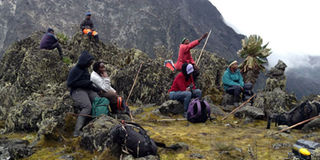Prime
Uganda raises concern over melting snow on Mt Rwenzori

Climbers take a break on one of the peaks of Mt Rwenzori. File photo
What you need to know:
- Cause. Carbon emissions from other parts of the world are responsible for the rise in temperature now responsible for the glacier retreat on top of Mount Rwenzori.
MARRAKESH.
As countries meet in Marrakesh, Morocco to discuss the implementation of the Paris Agreement, the Ugandan delegation has expressed concern over the global rise in temperature which has resulted into the melting of snow on top of Mt Rwenzori.
Mt Rwenzori is located in western Uganda at the Uganda-Democratic Republic of Congo border.
In an interview with the Daily monitor, Prof John Kaddu, the team leader of the adaptation, loss and damage thematic group of Uganda’s delegation, said carbon emissions from other parts of the world are behind the rise in temperature now responsible for the glacier retreat on top of Mt Rwenzori.
“The melting of snow emerges from the rising temperatures which dates back from many centuries of gases from industries,” Prof Kaddu said.
Uganda’s briefing paper at the 22nd Conference of Parties to the United Nations Convention on Climate Change currently ongoing, indicates that the snow has melted from 7.5Km in 1905 to 1.5km in 2006.
According to the same document, temperature change from the median in the next coming 50 years is projected at +2 to +3 degrees celicious across the country.
As a result of increased emissions, Prof Kaddu said something like a blanket forms up in the atmosphere (greenhouse gases) causing the rise in temperature. Prof Kaddu said the mixture of gases have led to the earth warming up.
He said the continued melting of snow on top of Mt Rwenzori is likely to impact negatively on people’s livelihoods.
“In Uganda when there is warming, there is snow melting and when the snow melts, you get irregular movement of water downstream from the snow,” said Prof Kaddu, adding that this water affects coffee growing on the slopes of the mountain and is responsible for flooding.
“Previously, we didn’t have malaria in the highland ecosystem because of cold but when there is warming, you get mosquitoes which start leaving at an altitude where they were not,” he added.
The climate change impacts are being felt across all ecosystems in the country, according to Uganda’s briefing paper.
At the negotiations, Prof Kaddu wants the large emitters of greenhouses gases to pay for the loses and damages because African countries only contribute four per cent to the world’s emissions
The COP22 president and Morocco minister of Foreign Affairs, Mr Salaheddine Mezouar, while addressing a press conference at the weekend said the Marrakesh conference is aimed implementing of the Paris Climate Agreement.
Agreement
The Paris Climate Agreement seeks to limit global warming well below 2°C and as close to 1.5°C as possible to prevent dangerous climate tipping points, beyond which the world may lose the ability to control the outcome. So far, about 105 countries, including Uganda, have ratified the Paris Agreement, which came into force on November 4.


